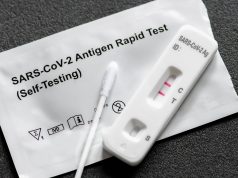No significant difference seen in cycle threshold values based on variant, regardless of vaccination status
FRIDAY, May 6, 2022 (HealthDay News) — Patients with severe acute respiratory syndrome coronavirus 2 omicron infection are less likely to be admitted to the hospital than those with delta infection, according to a study published in the May issue of eBioMedicine.
Amary Fall, Ph.D., from the Johns Hopkins School of Medicine in Baltimore, and colleagues conducted a retrospective observational cohort study between the last week of November and end of December 2021 to examine whether clinical outcomes and viral loads differed between delta and omicron infections during the period when both variants were circulating.
The omicron variant displaced delta during the study period, and by the end of December 2021, it accounted for 95 percent of the circulating lineages. The researchers found that the 1,119 patients with omicron infections were more likely to be vaccinated than the 908 patients with delta, but they were less likely to be admitted, require intensive care unit level care, or succumb to infection, irrespective of vaccination status (cycle threshold values [95 percent confidence intervals], 0.33 [0.21 to 0.52], 0.38 [0.17 to 0.87], and 0.26 [0.06 to 1.02], respectively). No statistically significant difference was seen in cycle threshold values based on lineage, irrespective of vaccination status. Compared with fully vaccinated patients without a booster and unvaccinated patients, boosted patients had reduced recovery of infectious virus in cell culture with the delta lineage. However, recovery of infectious virus was not affected by vaccination for patients with omicron infections.
“Our data suggests that omicron infected patients are less likely to develop severe disease when compared to delta, yet we show that omicron is associated with more infections of fully and booster vaccinated individuals likely due to immune evasion,” the authors write.
Copyright © 2022 HealthDay. All rights reserved.








